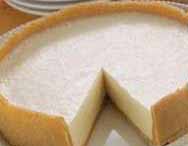Decadent treats are back on the menu. In fact, with healthy natural sweeteners, low glycemic flours and slimming fats, you can whip up delicious desserts that pack serious nutrition too such as this gluten free cheesecake recipe from Kelly Herring of the Healing Gourmet, who writes about decadent treats such as gluten free cheesecake.
Gluten Free Cheesecake Recipe
The first step in making healthier baked goods such as a gluten free cheesecake recipe is to take a close look at the flour you use. Many bakers now choose whole grain flours over refined white flours. However, whole grain flours are still very high in carbohydrates and score high on the glycemic index.
High glycemic foods cause your blood sugar to spike, raising insulin levels. Your blood sugar is directly linked to nearly every chronic disease including diabetes, cancer, heart disease, metabolic syndrome, obesity, macular degeneration and many more.
Unfortunately, most gluten free flours use a combination of high glycemic ingredients like rice flour, potato starch, tapioca flour and sorghum flour. So while the gluten is missing, all the blood sugar-spiking effects are still there.
Almond Flour: This staple flour can be used to create everything from fluffy pancakes to crispy cookies. I often make almond flour pancakes with my own strawberry syrup….. mucho mucho yum yum!
Erythritol: Considered the “almost sugar” by health experts and pastry chefs alike. Erythritol is a “sugar alcohol” with a glycemic index of zero and zero calories. It has no effect on blood sugar or insulin levels and is safe for diabetics. It can be used cup for cup in recipes just like sugar, and provides about 70% of the sweetness. . Erythritol is derived from corn and should be avoided by those with a corn allergy.
Stevia: A super-sweet herb native to Paraguay that is up to 300X sweeter than sugar. Stevia is best used to increase the sweetness of a sugar alcohol, like erythritol, rather than the sole sweetener in a recipe. Pure stevia extract should be used sparingly.
Why organic? Organic foods are free of pesticides, growth hormones, antibiotics and genetically modified organisms which have a wide-range of health harming effects. While buying organic produce is important, opting for organic animal products is absolutely essential. That’s because meats, eggs and milk products are a concentrated source of the foods (and chemicals) consumed by the animals that provide them.
Don’t resist the urge to splurge… here’s how to make your cake and eat it too with this gluten free cheesecake recipe!
Yummilicious! Gluten Free Cheesecake Recipe.
Cheesecake with Shortbread Crust & Raspberries
Yield: 12 servings
Start to Finish: 5 hours
Nutrition Snapshot: 147 calories, 1 grams sugar, 2 grams fiber, 4 grams protein, 3 net carbs
Ingredients
• 3/4 cup almond flour
• 7 Tbsp. organic erythritol
• 1/2 tsp. stevia extract
• 5 Tbsp. organic butter, melted
• 1 pastured egg
• 1/2 teaspoon organic vanilla extract
• 3/4 cup organic sour cream
• 8 ounces organic cream cheese, softened
• 3/4 cup fresh organic raspberries
Preparation
1. Preheat oven to 350 degrees F.
2. First, make crust. Whisk together almond flour, 1 Tbsp. erythritol and 1/8 tsp. stevia. Mix in 4 Tbsp. melted butter and press into the bottom of a pie pan. Bake for 15 minutes, or until golden brown around the edges. Let cool.
3. Reduce oven temperature to 325 degrees F.
4. In a small bowl, whisk together eggs, vanilla, sour cream, and remaining erythritol and stevia. Beat cream cheese and remaining melted butter together until smooth. Add cream cheese mixure to egg mixture and beat until smooth.
5. Pour cheesecake batter onto baked crust and transfer to oven.
6. Bake for 35 minutes using the water bath method. Remove from oven and let cool. Transfer to oven and refrigerated 4 hours or until firm.
7. Top with fresh raspberries and serve.
More scrumptious eats like creme brulee and brownies at the Healing Gourmet.
Nutrition Information Per Serving
177 calories 16 g total fat, 8 g saturated fat, 0 g trans fat, 6 g monounsaturated fats, 2 g polyunsaturated fats, 52 mg cholesterol, 16 mg sodium, 5 g carbohydrate, 2 g fiber, 1 g sugars, 4 g protein

